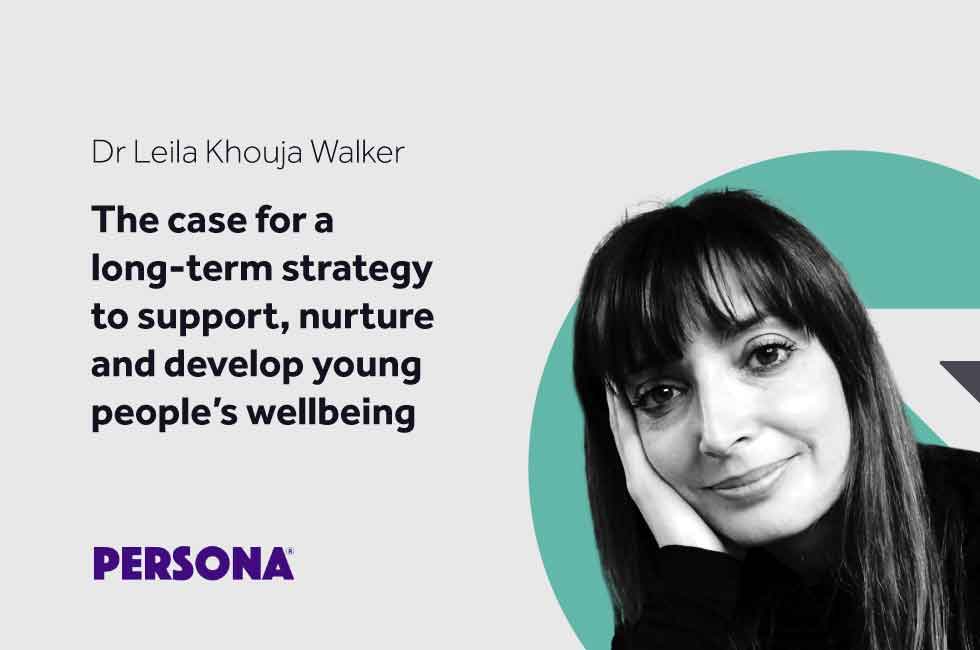As we move into the second year of our work at the Foundation for Education Development (FED) and following the launch of the FED National Education Consultation Report, we hosted a series of roundtable discussions seeking to answer the theme ‘Whatever happened to…?’. This roundtable discussion focussed on ‘Whatever happened to…wellbeing?’
We asked Dr Leila Khouja Walker, Co-Founder/Chief Product Officer at Persona Education to share her input into the roundtable discussion. In this thinkpiece, Leila talks about the need for a long term strategy that will address the decline of teenagers wellbeing and social emotional-skills. Leila challenges us to think about ‘How many schools recruit specialists to deliver wellbeing and social-emotional learning?’.
The case for a long-term strategy to support, nurture and develop young people’s wellbeing – A Global Perspective
The decline of teenagers’ wellbeing and social-emotional skills
Even before the pandemic – self reported wellbeing[1] in the UK was found to be on the decline by over 20% from age 8 to age 16, and 26% among girls. This self-reported drop in wellbeing is not uncommon across different geographical regions[2].
In September 2021, the OECD published a comprehensive, global survey[3], showing 15 year-olds reporting significantly lower social-emotional skills than 10 year-olds.
“The interconnected development of cognitive, social and emotional skills starts during early infancy and continues throughout one’s lifespan…. unlike academic learning, the development of students does not follow a steady upward trend.
Source: OECD, Beyond academic learning, 2021
Is this similar decline in wellbeing and social-emotional skills a coincidence? Absolutely not. Research[4] shows that supporting young people’s development of social-emotional skills has a positive impact on wellbeing as it improves their sense of agency and purpose, their academic attainment and their employability chances.
A resurgence in SEL – social-emotional learning
Many educators are now awakening to the positive correlation between improved social-emotional skills and wellbeing. However, social-emotional learning has been historically positioned within arguably the least loved area of a school curriculum. For example, in the UK it is often positioned within PSHE (Physical, Social, Health & Economic education).
How is the poor implementation of social-emotional learning observed? Well, in many schools it is taught by non-specialist teachers. It is delivered in restricted curriculum time often with no common framework for measuring impact[5]. This is before we even start investigating the woefully inadequate funding ring fenced for this area of the curriculum.
The need for a long-term strategy
Let’s use the findings of the OECD 2021 report to clarify the issues around short-term planning, and therefore make the case for longer term strategy reform when aiming to raise wellbeing amongst young people, but also throughout their lifetime.
Learning skills through a scaffolded approach is often most successful for student outcomes. However, with long-term planning in short supply, this pedagogical structure is usually not implemented when developing the social-emotional skills required for wellbeing. A possible explanation is that the development of social and emotional skills is not systematically incorporated into the school curriculum to the same extent as development of cognitive skills such as reading and mathematics.
How many schools recruit specialists to deliver wellbeing and social-emotional learning? The answer? Not many. This all adds up to a perception of “not important” long-term planning to create a pipeline of specialist teachers who can make the most impact is urgently required.
Meanwhile, whilst many schools are now adopting wellbeing measures, such as termly surveys, there is no common measure/census in the UK, or indeed most other countries. So, it is hard to see who is doing well and making the most progress, and therefore what policy to implement.
Finally, Emma Thomas, CEO of the children’s charity Young Minds, has called for “a ring-fenced fund”[6], which would ensure schools could afford the mental health and wellbeing support that young people need.
So – a lot of considerations for making a long-term strategy work. But, without doubt the only route to bucking the deeply worrying downward trend in wellbeing during young people’s most formative years.
[1] Hannay. T, (2019). Are children happy? School Dash
[2] Six seconds, (2018). State of the heart report.
[3] OECD, (2021). Beyond academic learning.
[4] Public Health England, (2021). The link between pupil health and wellbeing and attainment. NAHT.
[5] Gregson. D, Bee Well, (2021).
[6] Young Minds, (2020). Coronavirus: Impact on young people with mental health needs.



